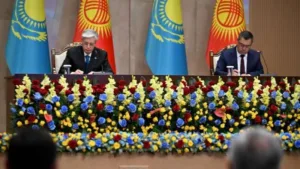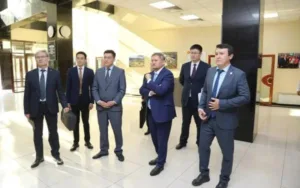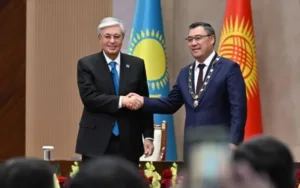Based on recent developments, including President Tokayev’s official visit to Kyrgyzstan, the launch of a pilot project to test wired internet speeds of up to 10 Gbit/s in Astana, and the start of engineering surveys in the village of Ulken for Kazakhstan’s first modern nuclear power plant, Kazinform News Agency presents a weekly review of the country’s coverage in foreign media.

Trend News Agency: Presidents of Kyrgyzstan, Kazakhstan mull over cooperation prospects
President of Kyrgyzstan, Sadyr Zhaparov, and President of Kazakhstan, Kassym-Jomart Tokayev, discussed a wide range of bilateral issues and prospects for future cooperation during a meeting in an expanded format, Trend.az reports via the Kyrgyz president’s administration.
The talks took place within the framework of Tokayev’s official visit to Kyrgyzstan. During the meeting, Zhaparov emphasized the deep-rooted historical ties between the two nations.
In response, Tokayev expressed gratitude for the warm hospitality and voiced his confidence that the visit would give a fresh impetus to the development of friendly relations between the two countries.
“Kazakhs and Kyrgyz are brotherly peoples. We share a common history, and our traditions and worldviews are similar. For centuries, our nations have lived in peace and harmony in the foothills of the Ala-Too. Today, our cooperation is dynamically developing within the framework of strategic partnership. We have strengthened political dialogue at all levels, based on mutual respect, and successfully operate intergovernmental, inter-parliamentary, and inter-regional councils,” Tokayev remarked.
The two leaders wrapped up the meeting by reaffirming their commitment to further strengthening Kyrgyzstan-Kazakhstan relations in all areas of shared interest and deepening their strategic partnership.
The Times of Central Asia: Kazakhstan trials ultra-fast 10G internet
Kazakhstan has launched a pilot project to test wired internet speeds of up to 10 Gbit/s in Astana, marking a major step in modernizing the country’s digital infrastructure, The Times of Central Asia reports.
The trial, carried out under a memorandum between Huawei Technologies Kazakhstan and Astana Innovations JSC, showcased next-generation equipment such as optical terminals, OLT systems, and Wi-Fi 7. In a demo zone, participants recorded speeds of up to 9,490 Mbps—enough for 8K video streaming and cloud gaming.
“The launch of 10G in Astana is a strategic step toward building a next-generation digital infrastructure,” said Gizat Amyrgaly, Chairman of Astana Innovations. “It is important for us that innovations quickly transition from testing to practical use.”
Huawei Kazakhstan CEO Sun Yaxiu emphasized the national significance: “Ultra-high-speed wired internet will open up new possibilities for the digital transformation of the urban environment, as well as for business, education, and healthcare.”
Enterprise CO Beeline CEO Rauan Kabdrakhimov confirmed the company’s readiness for rollout: “Our priority as a digital operator is to apply cutting-edge technology to deliver the best customer experience. We are pleased to be a technology partner in this important initiative.”
10G PON, unlike 4G or 5G, refers to actual speed—10 gigabits per second. The project’s roots trace back to the June 2025 China-Central Asia Forum, where Astana and Huawei agreed to explore future deployment of 50G PON. Experts note that its success could accelerate the spread of advanced digital services across Kazakhstan.
Euractiv: Kazakhstan aims to revive Cold War-era Baikonur spaceport for the new rocket race
On the dusty steppes of Central Asia, Kazakhstan is trying to breathe new life into the Baikonur Cosmodrome, once the pride of the Soviet space race, Euractiv reports.
Much of the site remains leased to Russia, but Astana is investing €1.3 billion to modernize facilities and attract international partners.
“There’s no time to waste,” said Azamat Doszhanov, head of KazCosmos, as technicians prepared the Zenit complex for Russia’s long-delayed Soyuz-5 rocket, due for its first test in December.
Built in the 1950s, Baikonur launched Sputnik in 1957 and Yuri Gagarin in 1961. After the USSR’s collapse, it was leased to Moscow until 2050.
To attract investors to Baikonur, Astana plans a special economic zone for “national space projects and foreign start-ups.” Talks are under way with India’s Skyroot, China’s Deep Blue Aerospace, and European firms. “We briefly discussed options for launch pads or joint grant applications,” said Christian Schiemer, CEO of Germany’s Hympulse.
China, pledging 100 million yuan for joint projects, may become Baikonur’s first new foreign partner.
Euronews: Kazakhstan breaks ground on first modern nuclear power plant
According to Euronews, Kazakhstan has begun work on its first modern nuclear power plant, launching engineering surveys in the village of Ulken, Almaty region, in partnership with Russia’s Rosatom.
“This project is a strategic choice for Kazakhstan, a driver of long-term economic growth for the region and the country as a whole,” said Almasadam Satkalityev, Chair of the Agency for Atomic Energy.
He noted that alongside the plant’s estimated $14–15 billion cost, about $1 billion will be invested in schools, hospitals, and other social infrastructure for the remote village.
Rosatom Director General Alexey Likhachev stressed the importance of site studies: “The start of engineering surveys in Ulken is the first step towards the first large-capacity nuclear power plant in modern Kazakhstan. At this stage, we are focusing our efforts on a thorough study of the site to be absolutely sure of its suitability.”
The initial exploration involves drilling at least 50 boreholes, 30–120 meters deep, to test seismic stability and environmental safety. The studies will last 18 months and determine the exact location of the facility.
The future plant will be powered by Russia’s VVER-1200 reactor, a Generation 3+ pressurized water reactor already in use in Belarus, Türkiye, and China. Each unit has a capacity of 1,200 MW and a lifespan of 60 years, extendable by 20 more.
In June, Kazakhstan confirmed Rosatom as lead contractor for the first nuclear plant, while China’s CNNC will lead construction of a second facility. Officials say nuclear power is critical to address the country’s rising energy deficit, which reached 2 billion kWh in 2024—enough to supply half a million households.
BBC Sport: Champions League would bring up to five top players to Celtic
Celtic’s hopes of strengthening their squad hinge on next week’s decisive clash against Kazakhstan’s Kairat, says former Dundee United and Hearts boss Robbie Neilson, BBC Sport reports.
Brendan Rodgers’ side were held 0-0 at Parkhead, leaving them needing victory in Almaty to secure a Champions League group stage spot. Fans voiced anger at the board during the draw, frustrated by a lack of summer signings.
“Not getting into the Champions League guaranteed is affecting the recruitment,” Neilson told the BBC’s Scottish Football Podcast. “Any top player they are looking at at the moment is probably waiting to see if they’re guaranteed Champions League football.”
“As soon as Celtic can guarantee that, I expect them to put the funds in and sign three, four, five top, top players to give them a chance to compete.”
Neilson added that the uncertainty is shaping negotiations: “At the moment there’ll be guys sitting there… saying, ‘if you make the Champions League, I’ll come to the club because one, I’ll probably get more money coming in but I’ll also get more exposure to then get the next move’.”
You can read last week’s weekly digest here.




